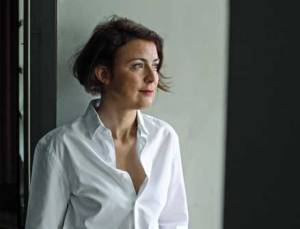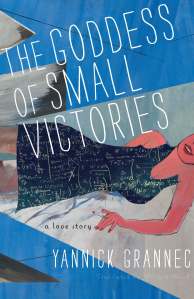Book Review: Completing Incompleteness
The Goddess of Small Victories by Yannick Grannec (translated by Willard Wood)
From what little I can glean, the Incompleteness theorems, truths established by the mathematical logician Kurt Gödel in 1931, show us that not all arithmetic is consistent or can be proven from within axiomatic systems of arithmetic. Godel's theorems utilize "set theory" regarding how we think of "infinity"; and paradoxes such as the familiar "liar's paradox" (This sentence is false) to illustrate and prove his theories of logic. Since neither mathematics nor logic are in my realm of expertise, that's about as deep as I can go by way of explanation without mucking it up. Gödel's scientific oeuvre is considered among the most significant contributions to the field of Mathematics in the 20th century, analogous in its importance to Einstein's work on general relativity, the photo-electric effect, and unified field theory in Physics.
So what does all this intellectual blather have to do with Yannick Grannec's debut novel? In an off-beat historical love story about the neurotic egghead, Gödel, and the exotic dancer, Adele, for whom he falls-- their escape from the Anschluss, ensuing immigration to New Jersey, and the consummation of their symbiotic relationship-- it becomes the ironic core of the work; Gödel being somewhat incomplete himself, enlists his spouse, seven years his senior, a mother substitute, as someone with the daunting responsibility to "complete" him. Although she fears this is impossible, Adele devotes herself to her unchangeable husband.
At the outset circa 1980, Anna Roth, an archivist for the Institute for Advanced Study, is given the formidable task of acquiring the Nachlass, or life's work, of Herr Gödel. In order to accomplish this she must secure the permission of his widow (the aforementioned Adele) who now resides in the atrociously decorated and pungent halls of the Pine Run Retirement Home. Adele is not immediately receptive to Anna's visits, but after some plying involving a bottle of bourbon, the ex-Cabaret entertainer loosens her lips and spills her history in dribs and drabs. So there you have the template for our tale: alternating chapters of Gödel-tell-all and young Anna's own parallel story.
 |
| Yannick Grannec |
Thankfully Grannec does not bore us with over-long explanations of scientific theory, and when she does include some mathematics and physics in the text, it is presented in either in an over simplistic or risible way, which turns out to be not only informative but enjoyable. She humanizes many historical figures like Robert Oppenheimer, Oskar Morgenstern, and of course Albert Einstein (a subset of Gödel's colleagues at Princeton). Much of what she relates is anecdotal, like Kurt Gödel's naturalization experience in which he informed the Judge of the flaw he had uncovered in the U.S. Constitution. "It strikes me as pertinent! The American Constitution has procedural limits but no fundamental ones," he admits to Einstein's chagrin. "Consequently, it could be used to reverse the Constitution itself." But more importantly, the author is sympathetic to these eccentric intellectual's female counterparts, not just Adele but women like her friend Lili Kahler-Loewy; supportive figures who are mostly marginalized in other historic accounts.
Meanwhile, Anna, whose parents both happen to be Princeton professors, attends Thanksgiving dinner at the house of their old family friends, the Adamses. Her childhood flame Leo Adams, another brilliant mathematician and prodigal son candidate, is there, brooding and slouching. Anna is ambivalent on the subject of Leo and to make matters worse, Adele's prior advice on the topic still must toll in her head: "I have some advice for you young lady. Avoid mathematicians like the plague! They squeeze you dry like a lemon, abduct you from everything you love, and don't even give you a brat in return!"
Will Anna heed the old lady's advice? Will Adele give up the prized Nachlass? These questions will finally be answered if one endeavors to complete Yannick Grannec's ambitious debut. Though, in a letter to his mother, Kurt Gödel reveals not just his belief in God, but his certainty that he could by logic prove His existence, there are many other mysteries in the physical world which may never be answered. But one thing we must remember that has already been proven is: in certain closed systems, we can never complete incompleteness.
Rating: 4.0 Stars

Comments
Post a Comment